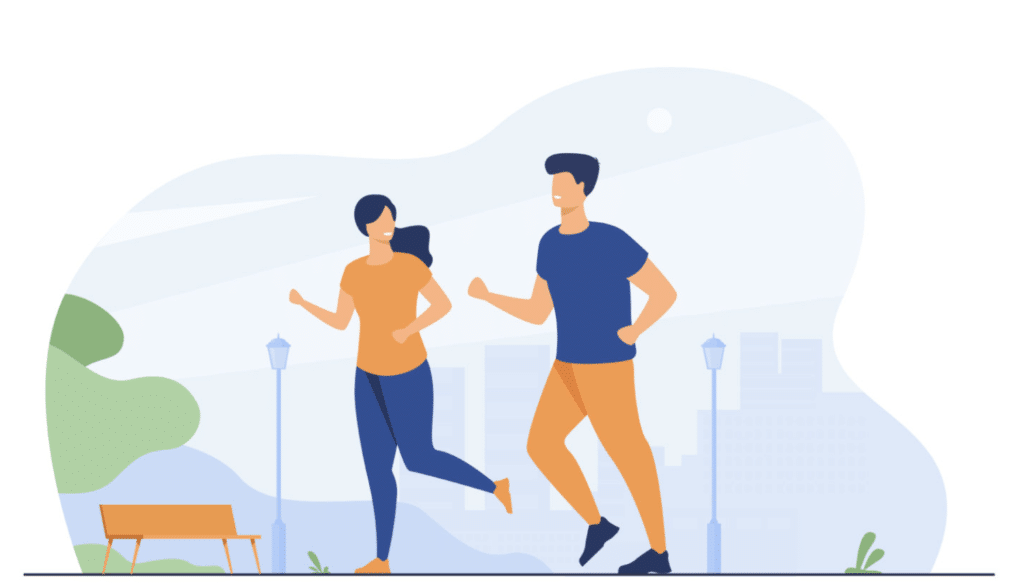
THE BOTTOM LINE
- Regular exercise reduces stress, improves health, and makes you sleep better
- The best exercise is the one you will do consistently
- Aim for at least 15 minutes of daily activity such as cardio, strength training, or yoga.
When it comes to health tips, exercise is one of those lifestyle factors that continually shows up as beneficial. The relationship between sleep and exercise is pretty darn cute. Not only does exercise help sleep, but sleep also boosts the benefits of exercise. Unfortunately, the opposite is also true. Sleep disturbances make it more challenging to exercise, which in turn can result in more sleep issues.
How does exercise help sleep?
Great question, thanks for asking! Exercise is so helpful for sleep it has actually been suggested as a nonpharmacological treatment option. Multiple studies have confirmed that exercise has positive effects on sleep quality, duration, and efficiency. It also helps people fall asleep more quickly. Exercise can even improve sleep-disordered breathing and sleep apnea. In one large clinical trial, 12 weeks of moderate exercise decreased the severity of obstructive sleep apnea by 25%, even though participants barely lost any weight.
Ok, but how does exercise help sleep?
- Better blood flow: Exercise improves your body’s ability to use oxygen and blood flow, which benefits brain and heart health, making every organ work more efficiently.
- Improves circadian rhythm: Early morning and afternoon exercise raises your body temperature, which then allows it to drop a few hours later, which can trigger sleepiness in the evening.
- Boosts the good stuff: Physical activity boosts feel-good chemicals like dopamine and serotonin and helps regulate hormones, improving sleep.
- Increases time in slow-wave sleep: Exercise has been shown to increase the amount of time people spend in restorative slow-wave sleep. These deep sleep stages are when the body releases human growth hormone which promotes muscle and tissue repair and can even make your skin glow.
- Reduces stress: The most powerful sleep-positive effect of exercise is that it helps reduce stress. Studies have found that engaging in regular physical activity can reduce stress levels by up to 40%. Not only does exercise help alleviate the stress you’ve experienced that day, over time, but it also improves the way your body reacts to stress.
How does my reaction to stress negatively affect sleep? When we encounter mental stress, our bodies send out inflammatory proteins, also known as cytokines. These inflammatory cytokines circulate in our blood, and when there is an overproduction, it can cause inflammation everywhere. This causes your body to stay in a state of high alertness, which impairs your ability to relax and sleep. Exercise reduces this inflammatory response, which not only helps you sleep better but also reduces your risk of disease, improves mental health, and even makes you mentally sharper.
Types of exercise and their effects on sleep
When it comes to exercise, the best type of exercise to do is the one you will actually do. If you try to force yourself to do activities you don’t enjoy or push yourself beyond your limits, exercise may feel like a chore. That being said, each type of exercise has unique sleep-promoting benefits.
1. Aerobic Exercise
All types of cardiovascular exercises such as walking, jogging, swimming, and biking that elevate your heart rate count as aerobic exercise. These activities have all of the sleep-promoting benefits of exercise and seems to work best when done regularly. Even as little as 10 minutes a day can improve your health and sleep.
How much do I need? Ideally, aim for at least 150 minutes a week with at least 90 minutes at moderate intensity (80% of your maximum heart rate).
Best time for aerobic exercise: The greatest sleep benefits of aerobic exercise come when it’s done in the morning or afternoon. However, many people find evening exercise equally good and non-disruptive to their sleep. It mostly comes down to individual differences and preferences.
2. Strength Training
Lifting weights, using resistance bands, or callisthenics are strength training techniques that focus on muscle building. Not only will lifting weights make you stronger, but it will also help you fall asleep faster. One study showed that weight training helped people fall asleep up to 45 minutes faster. Even when done in the evening, lifting weights was associated with improved quality of sleep,
How much do I need? To start out, try adding a resistance training routine that has you train different muscle groups three times a week. You don’t have to be a powerlifter; just focus on challenging yourself enough to make those muscles grow. You can add a strength training routine after your cardio sessions or do it separately.
Best time for strength training: Strength training can be done any time of day, with some people gaining extra snooze-inducing benefits when it’s done later in the day.
3. Flexibility Training
Exercises that focus on stretching and flexibility, such as yoga, are health-promoting and stress-reducing. Certain types of yoga, such as Yoga Nidra, have been found to be especially useful for helping people fall asleep and may even work for insomnia. Yoga, pilates, and stretching can also help alleviate chronic pain, which is very disruptive to sleep for millions of people.
How much do I need? Ideally, aim for daily light stretching or yoga as a part of your morning or daily routine. There are many free online yoga classes and stretching routines available. You can also do certain relaxing yoga poses from the comfort of your own bed, such as happy baby or waterfall.
Best time for flexibility training: Any time of day works, but it can be especially relaxing before bed.






